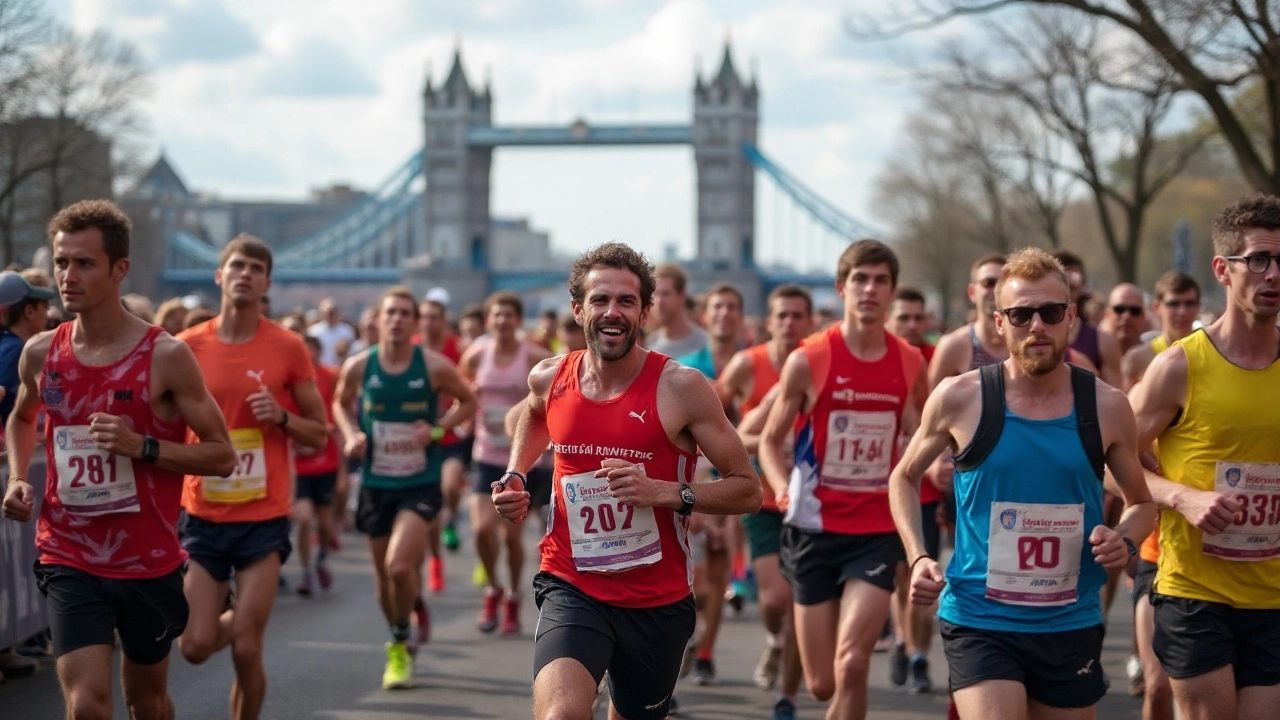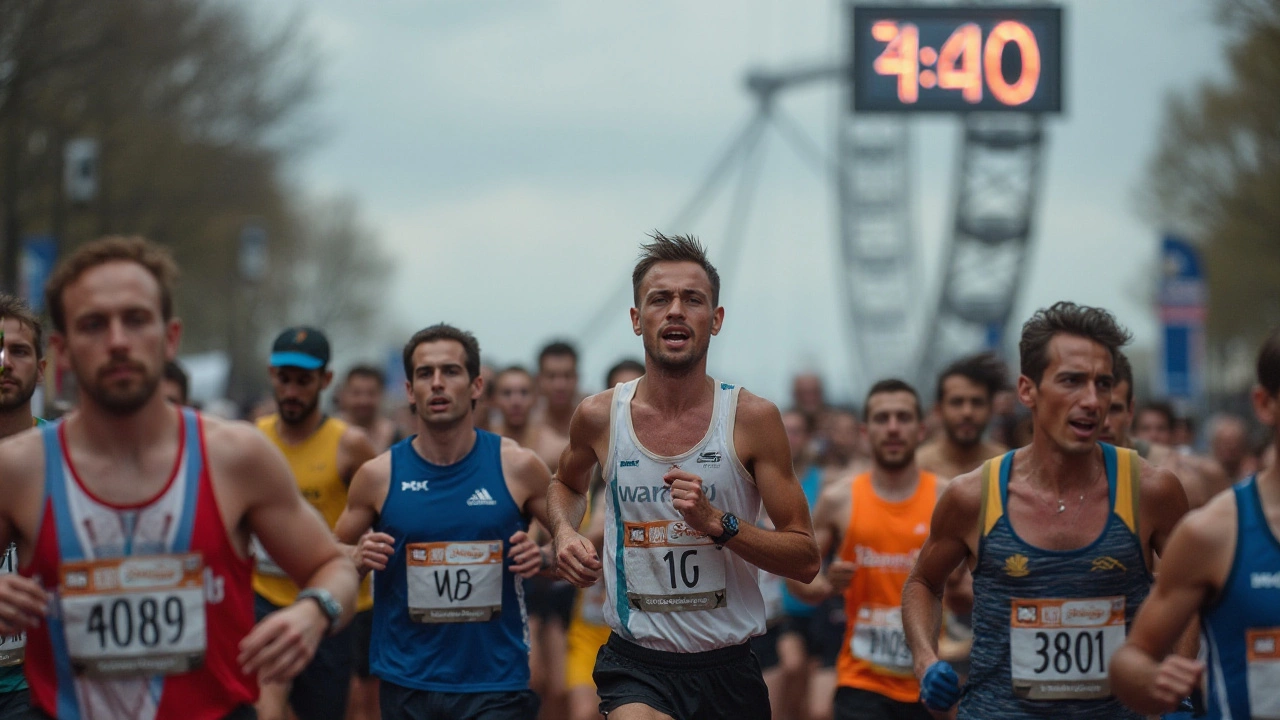Average Marathon Completion Time: Insights and Tips

Running a marathon is no small feat, and the time it takes to cross that coveted finish line can vary widely. The average marathon completion time serves as a benchmark for many, but it's important to remember that each runner's journey is unique. How long does it actually take to complete those 26.2 miles? Let's explore the factors that influence these times and how you can set a target that fits your personal running style.
Marathons have fascinated runners around the globe, inspiring them to lace up their running shoes and hit the pavement. While some aim for personal records, others relish the experience itself. This article provides an in-depth look at how long it takes most runners to complete the race and offers strategies to help you improve your own time.
- Understanding Average Times
- Factors Affecting Marathon Completion
- Setting Realistic Goals
- Improving Your Personal Best
Understanding Average Times
When diving into the world of marathons, one common curiosity is how long it typically takes most people to finish the race. On average, marathon times span a wide range, reflecting the diverse abilities and goals of runners. According to statistics from the Running USA Annual Marathon Report, the median marathon time for men is about four hours and fifteen minutes, while women average around four hours and forty-five minutes. These times, though, can fluctuate based on various factors including age, experience, and motivation.
Age plays a critical role in determining a runner’s time. Younger participants, usually those in their 20s and 30s, tend to clock faster times. This isn’t always the case, however, since marathon running also demands endurance and strategy, which can improve with experience. Interestingly, older runners often leverage their wisdom and pacing skills to maintain competitive times, particularly those who have honed their abilities over years of consistent running. Research shows that individuals who train methodically over several years often outshine their younger counterparts who may have only recently adopted running as a hobby.
Another factor affecting the average marathon time is the type of marathon itself. There are races designed to be especially fast, like the Berlin Marathon, frequented by elite runners aiming to break records. In contrast, famed marathons like New York City or Boston include challenging terrains and more diverse runner profiles, contributing to varied average completion times. This means the race location and course difficulty significantly influence how swiftly participants cross the finish line. Opting for a marathon with a flat course can be advantageous if you aim to test or improve your speed.
Weather conditions also make a substantial difference. A marathon scheduled in the sweltering heat or frigid cold can dramatically impact performance, slowing average times. It’s common knowledge among runners that the perfect marathon weather resides in the cooler, more temperate range, where overheating is less likely, and stamina is more sustainable. However, many choose marathons in climates unfashionable for peak performance for the additional challenge and personal satisfaction of conquering the elements.
Aspiring runners often wonder how best to gauge their potential completion time. While some turn to formulas based on training runs and other event times, others rely on tools like pace calculators. Gregg McMillan, a renowned running coach, suggests in his book 'You, Only Faster' that using your best half-marathon time can offer a reasonable estimate of your marathon potential by doubling the time and adding 10 to 20 minutes, a guideline validated by countless runners.
The understanding of average marathon times is, thus, a tapestry woven from the individual runner stories, course particulars, and environmental elements, with each thread offering insights into how diverse the running experience can be. It is these elements that make marathons compelling: Whether you are an elite competitor or a first-time participant, embracing the variability in completion times can enrich your journey to the finish line.
"To sit back and let fate play its hand out and never influence it is not the way man was meant to operate." – John Glenn

Factors Affecting Marathon Completion
When considering the time it takes to finish a marathon, several variables come into play. One significant factor is the runner's physical condition. A marathon requires a high degree of endurance, strength, and resilience. Those who engage in regular strength and conditioning exercises are often better equipped to handle the physical demands. Nutrition also plays a critical role; a balanced diet that fuels the body efficiently can help maintain energy levels throughout the race. Hydration before and during the marathon is essential too, as it significantly impacts performance and endurance.
Another crucial element is the runner's age. Marathoners in their late 20s to early 30s often have an advantage, benefiting from peak physical capability and experience. However, this doesn't mean older or younger individuals can't excel. With the right training and dedication, marathoners of any age can achieve impressive results. Genetics also influence marathon completion times. Some people have a natural predisposition for endurance sports, which can give them an edge in marathon success.
The environment in which the marathon takes place affects completion times as well. Weather conditions can be a make-or-break factor. A sunny and humid day can be challenging even for seasoned runners, leading to higher times compared to cooler, cloudy conditions. The marathon course itself can be a factor—flat courses generally contribute to faster finishes compared to hilly terrains, where the constant elevation changes demand more from the runners.
Training methodologies and strategies are another critical consideration. Runners who adhere to a structured training program that incorporates a balance of speed work, long runs, and recovery days often see better results. The psychological factors are not to be underestimated either. The mental toughness required to push through fatigue and discomfort has a significant impact on a runner's ability to complete a marathon. Confidence and determination can propel runners forward, especially in the latter stages of the race.
"A marathon is like life with its ups and downs, but once you've done it you feel that you can do anything," said Olympic Gold Medalist Emil Zatopek, highlighting the blend of physical and mental endurance required to succeed.
Lastly, proper pacing is integral to finishing a marathon in a desired time. Too fast a start can lead to burnout midway, while a conservative beginning can help sustain energy for a strong finish. Technological aids, like GPS watches, can provide real-time feedback that helps runners stay on track with their pace. These diverse elements together create a tapestry of factors that influence marathon completion, each contributing in its unique way to the runner's experience and time.

Setting Realistic Goals
Embarking on a marathon journey comes with myriad challenges and one of the key first steps is setting realistic goals. Striking a balance between ambition and reality is essential. Many budding marathoners dream of quick finishes, but understanding the nuances of each individual's capabilities often requires more grounded planning. Reflect on your current pace, training background, and any previous marathon experience to gauge a suitable target time. Remember, aiming too high might lead to burnout or injury. What's more essential is to focus on progress over perfection.
When setting a goal, consider the average completion times for marathons. For reference, data from the Running USA study in the last decade shows that the average marathon finish time for men is just over four and a half hours. For women, it's slightly under five hours. Setting your personal target within this context can provide a measure of assurance that your goal is within reach. However, it's crucial to keep in mind that everyone's journey is different, and your pace might naturally differ due to many personal factors, including age, fitness level, and even the day's weather conditions.
"It's not just about finishing the race, but how you feel when you cross that finish line," suggests renowned marathon coach Hal Higdon. This resonates strongly with the concept of realistic goal-setting anchored in both tactile achievements and personal satisfaction.
Strategic goal-setting also means being willing to adjust and adapt. As you progress in your training, assess your improvements and adjust your goals accordingly. If you're consistently exceeding your targeted splits, perhaps it’s time for a slight adjustment to a more challenging but still achievable time. Conversely, if injuries or fatigue slow you down, there's wisdom in recalibrating your aspirations to prevent long-term detriment. Crafting a flexible yet focused plan empowers you to handle unexpected hurdles with grace.
Creating a Plan
Developing a clear training plan is key to achieving your marathon goals. A typical approach includes a mix of long runs, speed work, cross-training, and rest days. An often recommended plan stretches across 16 to 20 weeks, allowing your body ample time to adapt to the running stresses. Within that outline, plan for incremental increases in your weekly mileage to build stamina gradually, allowing for recovery weeks where you reduce intensity to help prevent overtraining.
You could benefit from joining a local running group or hiring a coach to tailor your training logs further. They offer not only structured guidance but also provide community and motivate during less enthusiastic training days. Online resources and marathon apps also offer pre-made training regimes accommodating different paces and skills. Remember to include plenty of rest and nutrition understanding in your plan, as recovery is just as imperative as the training itself.
Running a marathon is a commitment, one where careful planning and goal-setting align you with both time and joy at the finish. Remember, the race is as much about self-discovery as it is about those miles. Approach it with patience, resilience, and an open mind that is ready to pivot and adapt as needed. Above all, relish the path you carve towards your personal best, celebrating every stride towards that aim.

Improving Your Personal Best
Achieving a personal best in a marathon takes dedication, strategy, and sometimes a bit of patience. There are several tactics you can employ to edge closer to your best time. One of the first steps is to implement a structured training plan, one that includes a mix of long runs, intervals, and recovery days. Long runs build endurance, while intervals boost speed and improve cardiovascular efficiency. This balanced approach helps enhance both stamina and quickness, essential components for marathon success.
"It does not have to be fun to be fun." – Mark Remy, Runner's WorldIncorporating cross-training activities such as swimming or cycling into your regimen can prevent burnout and reduce the risk of injury. These activities provide a welcome change of pace while still contributing to overall fitness. Additionally, strength training should not be overlooked, as it fortifies muscles, increases running economy, and aids in faster recovery between runs. Consider including workouts focused on building core stability and leg strength, both of which are crucial for maintaining correct form during a race.
Diet and nutrition play pivotal roles in improving marathon performance. A balanced diet, rich in carbohydrates, proteins, and healthy fats, provides the fuel needed to power through intensive training sessions. It's important to stay hydrated, but do remember that electrolytes lost through sweat need replenishing, too. Test different fueling strategies during your training to find what works best for your body. Small adjustments in diet can lead to significant improvements in how you feel and perform on race day.
Another key to enhancing your marathon time is mental preparation. Visualization techniques can be powerful, as many seasoned runners attest. Imagine yourself successfully completing each segment of the race, overcoming challenges, and finally reaching the finish line. This practice builds mental toughness and confidence. On race day, strategic pacing is crucial; start slower than you might want to ensure you have enough energy left for a strong finish. Your mind can often push your body farther than you think, so keep your mental game strong.
Track and Analyze
Keeping a detailed running log is invaluable for identifying patterns and making data-driven decisions about your training. Record distances, times, conditions, and how you felt during each run. This information can signal when to push harder or when it's prudent to rest. Many runners find technology aids performance—consider using fitness apps that track metrics like heart rate and pace. They not only provide insights but motivate through goal-setting features. Monitoring progress over weeks and months shines light on areas needing improvement.The race landscape is constantly evolving, marking new additions to challenge our best. While focus on a personal best can be intense, balance between ambition and enjoyment keeps the endeavor rewarding. As you work toward your goals, remember that each step brings you closer to surpassing your limits. Celebrate every milestone on the road to your best and embrace the journey, not just the destination.
